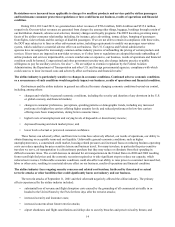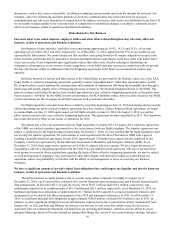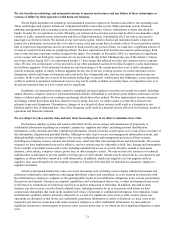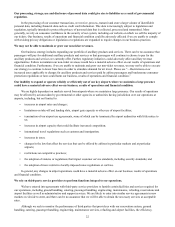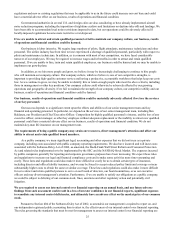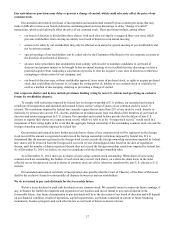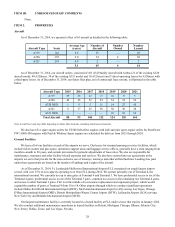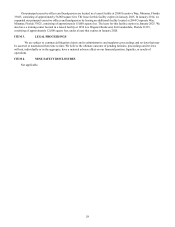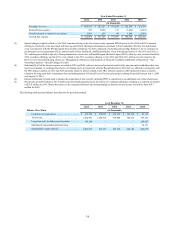Spirit Airlines 2014 Annual Report Download - page 24
Download and view the complete annual report
Please find page 24 of the 2014 Spirit Airlines annual report below. You can navigate through the pages in the report by either clicking on the pages listed below, or by using the keyword search tool below to find specific information within the annual report.24
have to lease or purchase aircraft from another supplier, we would lose the significant benefits we derive from our current
single fleet composition. We may also incur substantial transition costs, including costs associated with retraining our
employees, replacing our manuals and adapting our facilities and maintenance programs. Our operations could also be harmed
by the failure or inability of aircraft, engine and parts suppliers to provide sufficient spare parts or related support services on a
timely basis. Our business would be significantly harmed if a design defect or mechanical problem with any of the types of
aircraft or components that we operate were discovered that would ground any of our aircraft while the defect or problem was
corrected, assuming it could be corrected at all. The use of our aircraft could be suspended or restricted by regulatory
authorities in the event of any actual or perceived mechanical or design problems. Our business would also be significantly
harmed if the public began to avoid flying with us due to an adverse perception of the types of aircraft that we operate
stemming from safety concerns or other problems, whether real or perceived, or in the event of an accident involving those
types of aircraft or components. Carriers that operate a more diversified fleet are better positioned than we are to manage such
events.
Reduction in demand for air transportation, or governmental reduction or limitation of operating capacity, in the
domestic U.S., Caribbean or Latin American markets could harm our business, results of operations and financial
condition.
A significant portion of our operations are conducted to and from the domestic U.S., Caribbean or Latin American
markets. Our business, results of operations and financial condition could be harmed if we lost our authority to fly to these
markets, by any circumstances causing a reduction in demand for air transportation, or by governmental reduction or limitation
of operating capacity, in these markets, such as adverse changes in local economic or political conditions, negative public
perception of these destinations, unfavorable weather conditions, or terrorist related activities. Furthermore, our business could
be harmed if jurisdictions that currently limit competition allow additional airlines to compete on routes we serve. Many of the
countries we serve are experiencing either economic slowdowns or recessions, which may translate into a weakening of
demand and could harm our business, results of operations and financial condition.
Increases in insurance costs or significant reductions in coverage could have a material adverse effect on our business,
financial condition and results of operations.
We carry insurance for public liability, passenger liability, property damage and all-risk coverage for damage to our
aircraft. As a result of the September 11, 2001 terrorist attacks, aviation insurers significantly reduced the amount of insurance
coverage available to commercial air carriers for liability to persons other than employees or passengers for claims resulting
from acts of terrorism, war or similar events (war risk insurance). Accordingly, our insurance costs increased significantly and
our ability to continue to obtain certain types of insurance remains uncertain. While the price of commercial insurance has
declined since the period immediately after the terrorist attacks, in the event commercial insurance carriers further reduce the
amount of insurance coverage available to us, or significantly increase its cost, we would be adversely affected. We currently
maintain commercial airline insurance with several underwriters. However, there can be no assurance that the amount of such
coverage will not be changed, or that we will not bear substantial losses from accidents. We could incur substantial claims
resulting from an accident in excess of related insurance coverage that could have a material adverse effect on our results of
operations and financial condition.
As of July 2014, we obtained third-party war risk insurance, which insures against some risks of terrorism, from the
commercial market. Previous to this date, we obtained this insurance through a special program administered by the FAA,
which was discontinued late 2014. Renewing coverage from commercial underwriters may result in higher premiums and more
restrictive terms. Our business, results of operations and financial condition could be materially adversely affected if we are
unable to obtain adequate war risk insurance. Our current war risk hull and liability insurance policy is effective until July
2015.
Failure to comply with applicable environmental regulations could have a material adverse effect on our business,
results of operations and financial condition.
We are subject to increasingly stringent federal, state, local and foreign laws, regulations and ordinances relating to the
protection of the environment, including those relating to emissions to the air, discharges to surface and subsurface waters, safe
drinking water and the management of hazardous substances, oils and waste materials. Compliance with all environmental laws
and regulations can require significant expenditures and any future regulatory developments in the United States and abroad
could adversely affect operations and increase operating costs in the airline industry. For example, climate change legislation
was previously introduced in Congress and such legislation could be re-introduced in the future by Congress and state
legislatures, and could contain provisions affecting the aviation industry, compliance with which could result in the creation of
substantial additional costs to us. Similarly, the Environmental Protection Agency issued a rule that regulates larger emitters of
greenhouse gases. Future operations and financial results may vary as a result of such regulations. Compliance with these


